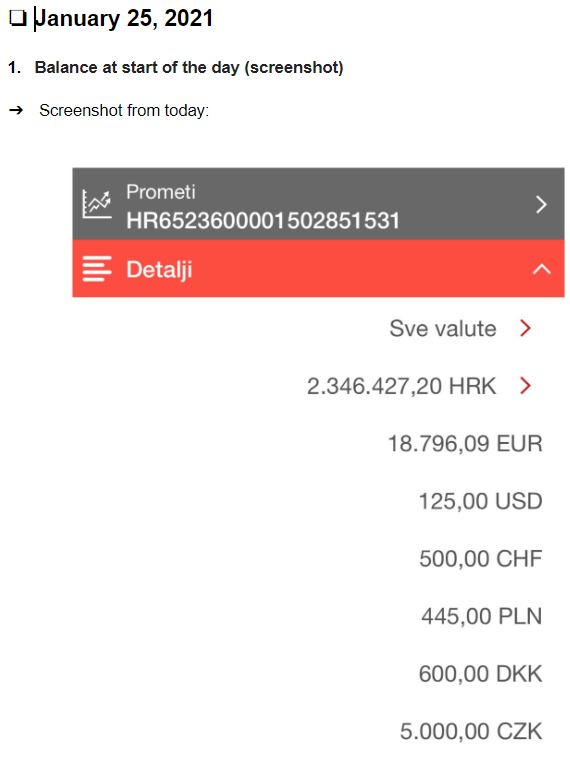Pope Donates €100,000 to Earthquake Victims in Croatia
ZAGREB, 26 January (Hina) - Pope Francis has donated, through the Pontifical Council for Integral Human Development, 100,000 euros in earthquake relief to Caritas Croatia for the residents of the earthquake-hit region of Banovina in Sisak-Moslavina County, Caritas Croatia said on Tuesday.
The donation, made on January 11, is intended for Caritas Croatia for urgent relief and support to the earthquake victims.
The Pontifical Council for Integral Human Development sent the donation to Caritas Croatia via the Apostolic Nunciature in Croatia. The Apostolic Nuncio to Croatia, Msgr. Giorgio Lingua, informed the President of Caritas Croatia, Msgr. Bože Radoš, of the donation in writing.
"Caritas Croatia thanks the Holy Father Francis for his expression of proximity in prayer and material assistance that will provide warm and safe shelter to those left without roofs over their heads,” said Bishop Radoš.
This and other donations from legal entities, Croatian Catholic missions and private citizens, by direct personal payments or by calling the donation telephone number ++385 (0)60 9010 (6.25 HRK with VAT included), will be used for the procurement of housing modules and the urgently needed care of the earthquake victims.
So far, Caritas Croatia has contracted the delivery of 100 housing modules with the company Tehnix. The first deliveries began on January 16. The need for housing is still great. Caritas Croatia is purchasing another 100 new housing modules and invites contributions from all people of good will, says a statement on the website of the IKA Catholic news agency.
For the latest information on the earthquake emergency, follow the dedicated TCN section.
Fund for Radioactive Waste Disposal: Čerkezovac Complex Undamaged by Quake
ZAGREB, 26 January, 2021 - The former Čerkezovac military barracks on Trgovska Gora is not located in standardly active faults and all its facilities were undamaged during the recent earthquakes, the Fund for financing the disposal of radioactive waste from the Krsko Nuclear Power Plant said on Tuesday.
The underground storage facilities that are part of the former Čerkezovac barracks have been selected as a preferential site for the storage of low and medium radioactive waste because of its storage capacities that guarantee complete technical safety. The site is not prone to floods and it is sufficiently distanced from drinking water, the fund underlined.
Čerkezovac is not located in a zone of active faults and during the recent earthquakes all the facilities at Čerkezovac were undamaged, the fund added.
"The storage facilities for radioactive waste will be built according to EUROCODES 7 and 8 with an increased factor of safety so that they can withstand earthquakes with greater magnitudes than expected and so that structures at the centre can be safe during earthquakes with great destructive force," the fund said.
For the latest information on the earthquake emergency, follow the dedicated TCN section.
Minister Says Demolition of Quake-Damaged Facilities to Begin This Week
ZAGREB, 26 January, 2021 - The demolition of buildings that pose the most risk to citizens in the earthquake-hit areas will start this week, Construction Minister Darko Horvat said after a meeting with representatives of the civil engineering profession on Monday.
He noted that the meeting held today was a continuation of dialogue launched with the competent professionals to define an effective concept of organised reconstruction in the earthquake-affected areas, noting that a meeting was held last Friday at the Croatian Standards Institute at which inputs necessary for possible correction of technical regulations were defined.
Horvat said that under discussion were all relevant inputs that would be needed in designing a strong and earthquake-resistant foundation, on which a new, classically built or prefabricated house will be built.
The minister stressed that houses without appropriate project documentation would not be rebuilt.
The dean of the Faculty of Civil Engineering, Stjepan Lakušić, said that geologists were now expected to specify where reconstruction was possible. After that, geotechnical testing will be done, after which a survey would be done to define soil properties, etc, he said.
Lakušić said that architects were working on standardised types of 50, 75 and 80-square-metre homes. He noted that the reconstruction of business facilities was also being discussed.
For the latest information on the earthquake emergency, follow the dedicated TCN section.
Croatian Red Cross Reports on Assistance Provided to Earthquake Victims So Far
ZAGREB, 25 January, 2021 -The Croatian Red Cross (HCK) said on Monday that it had received 68,378 donations for victims of the 29 December earthquake, totalling HRK 44,305,655.
HCK registers 3,368 people who left their homes after earthquake
The HCK Search Service has so far registered 3,368 people who have been evacuated to temporary accommodation centres or have left for other parts of the country.
HCK employees and volunteers have been helping the earthquake victims restore contact with their families as well as locate persons whose whereabouts are not known to their families and who have not been evacuated to temporary accommodation centres.
HCK teams work in evacuation centres and visit earthquake victims on a daily basis.
More than 580 tonnes of food, 94 tonnes of toiletries distributed
The HCK has so far distributed more than 580 tonnes of food, 94 tonnes of toiletries, 46 tonnes of clothing, 2,174 heaters, 2,602 blankets, 114 power units, more than 3,000 packages with baby food and equipment and more than 260 packages for animals.
Also, more than 7,200 services of psychosocial support have been provided to earthquake victims, the HCK said.
For the latest information on the earthquake emergency, follow the dedicated TCN section.
Firefighter Whose Petrinja Rescue Dog Was Poisoned Given New Puppy
January 26, 2021 – Firefighter Srđan Botica from Slano near Dubrovnik was inconsolable after his hero Petrinja rescue dog Alice was poisoned a few days ago. Although irreplaceable, Srđan's friends could no longer stand by and watch him grieve undeservedly, so they bought a brand new Belgian Shepherd puppy to cheer him up
Srđan Botica was inconsolable after the death of his dog, Alice. Although she was still quite young, Alice and Srđan had built a strong bond between them. The training required for a dog like Alice to become a specialist search and rescue dog will have that kind of effect. The relationship Srđan established with Alice was strengthened both in his workplace, where Srđan is a firefighter and at home, which is where Srđan brought Alice each evening.
The final test of the pair's attachment was to be the rubble left in the aftermath of the Sisak Moslavina earthquake. Srđan volunteered to travel from Dubrovnik to help in the response. Alice became a Petrinja rescue dog, scouring the damaged and fallen buildings for survivors. The inseparable pair stayed for six days undertaking their work.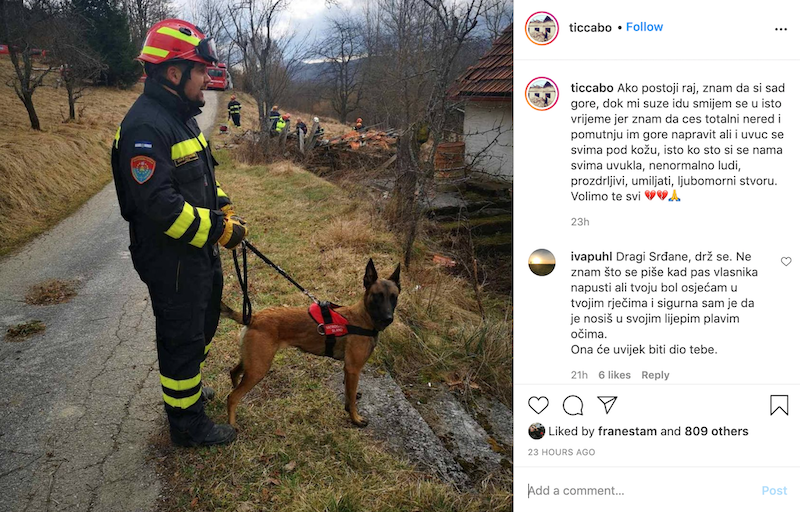 Srdan and Alice at work after the earthquake
Srdan and Alice at work after the earthquake
As TCN was saddened to report over recent days, the partnership of Srđan Botic and his Petrinja rescue dog Alice was tragically cut short within weeks of their return. Alice was poisoned on the streets of her home in Slano, near Dubrovnik.
Though Petrinja rescue dog Alice was one of a kind and can never be replaced, the friends of firefighter Srđan Botica could no longer sit by and watch his undeserved grief. Over the last couple of days they clubbed together and bought Srđan a new dog. Srđan's new housemate goes by the name of Amy and she's still just a puppy. Amy is a Belgian Shepherd, the exact same breed as Petrinja rescue dog Alice.
It is probably still too early to say whether Amy will follow in Alice's pawsteps to become a search and rescue dog. But, Belgian Shepherds are one of the best-known breeds for this kind of work. They are used as search and rescue dogs by firefighters and mountain rescue in many countries, and as police and military dogs. They have a good reputation as sniffer dogs, particularly in the field of finding illegal drugs. Several Belgian Shepherds have been decorated for bravery and they are very protective of their owners and handlers.
The US Secret Service, Israel Defence Forces, Indian NSG commando unit and Royal Australian Air Force use Belgian Shepherds in their work. The breed is second in number only to the German Shepherd for use across the whole of the US Armed Forces.
Earthquake Donations in Action: Croatian Entrepreneurs (UGP) Fund Report, January 25
January 25, 2021 - Transparent donations getting to the people who need them most are essential in emergency response. TCN follows the Voice of Entrepreneurs Glas Poduzetnika (UGP) fund to report on the realities on the ground.
The donations are pouring in from all over the world to help the victims of the earthquakes in Petrinja, Glina and Sisak, donations which have been gratefully received and which are making a difference.
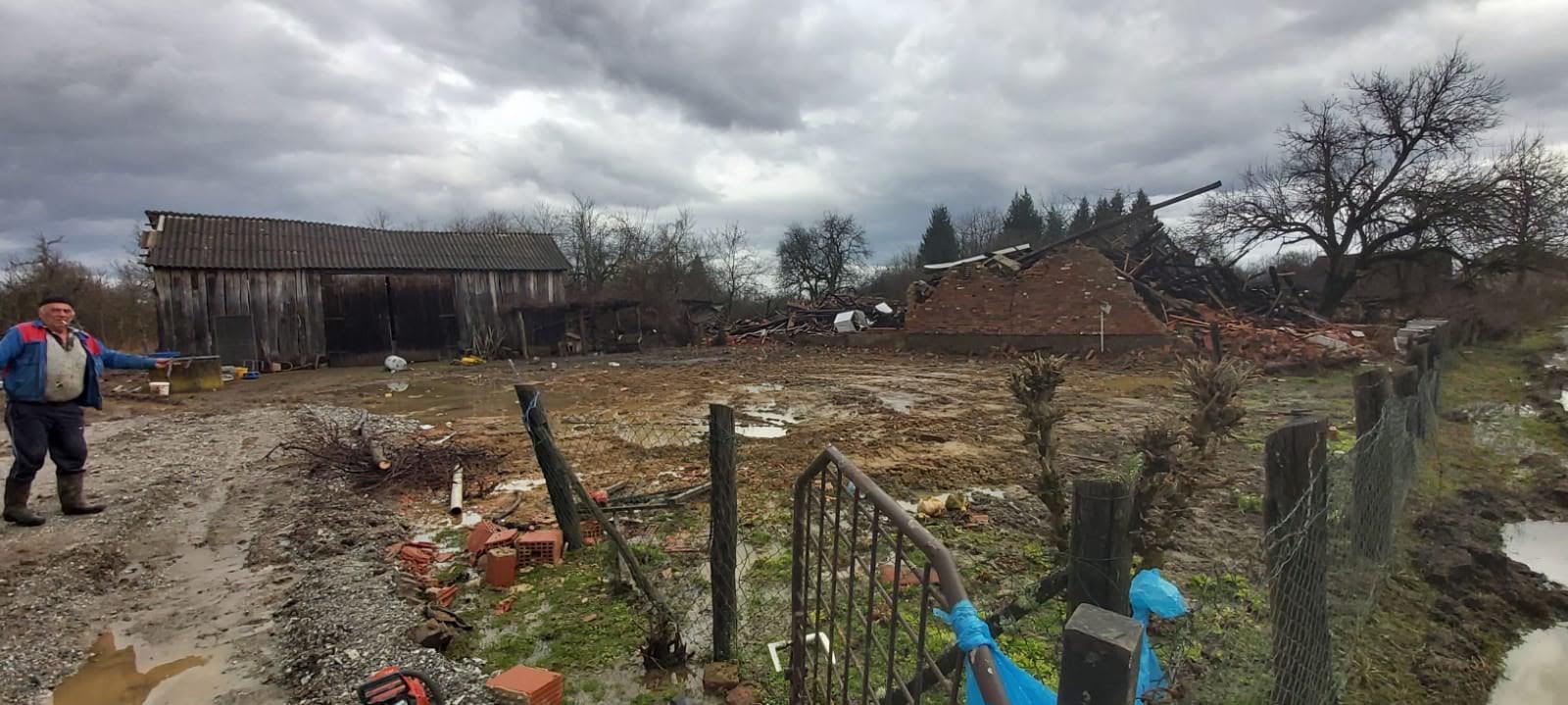
As I wrote previously, many people have contacted us at TCN asking for advice on the best place to send money. We published a list a few days ago, but I was really happy to see one more fund set up a couple of ago, from Udruga Glas Poduzetnika, or Voice of Entrepreneurs, which is a growing force for reform and change in Croatia. Run by people who want to see an end to corruption and needless red tape, I was sure that their efforts to help their fellow citizens in crisis would be transparent, dynamic, focused and effective, with all money donated going to the people who needed it most. And so it proved, which is why I am now directing anyone looking for a place to donate to UGP, as I explained a few days ago.
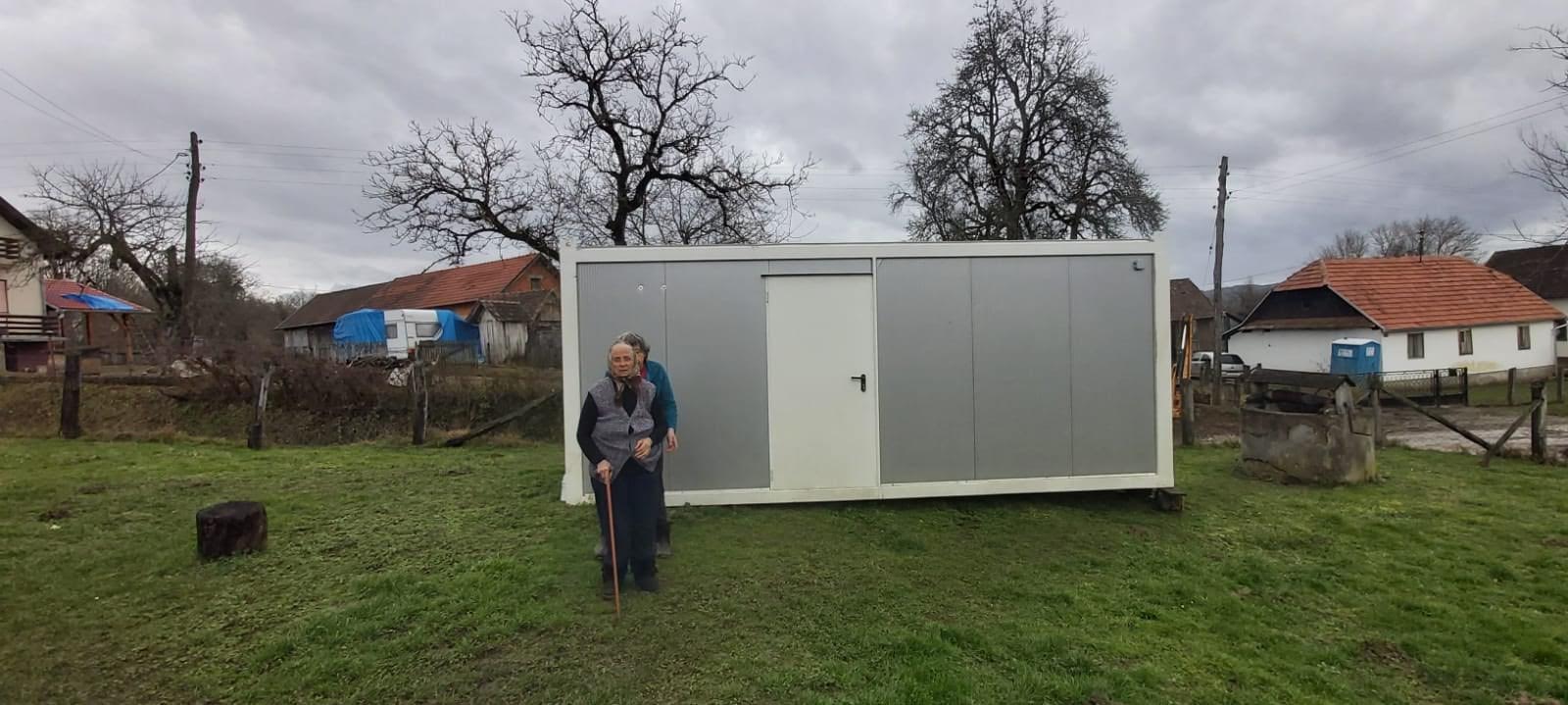
UGP co-founder Drazen Orescanin was kind enough to give me an in-depth interview yesterday on the focus, plans and activities of the UGP fund, and it was great to hear that 100% of the money donated will go to help those who need it most.
In order to provide more transparent donation information, we agreed to publish a daily report of the fund's activities, finances and purchases. As resources and time allow, this will be a daily feature, and you can track progress here.
Daily activities
On Saturday, we delivered two housing containers to the family of Milan Bjelan and Jovanka Demonja. Now, families can be safe while they await for the renovation of their houses. There are still two more housing containers that we have to deliver in the following days.
What's next?
In the following weeks we will work on the project of the first UGP houses and on the development of the “Center for New Life” - residential/business container settlement in Petrinja. UGP is working closely with volunteers from Sisak-Moslavina county to find the best solutions for the renewal of the county.
Information in English for donations, both for donations from Croatia and abroad.
For the latest news on UGP, follow the dedicated TCN section.
For the latest information on the earthquake emergency, follow the dedicated TCN section.
Petrinja Quake to Bring Into Question Nuclear Waste Disposal Site at Trgovska Gora?
ZAGREB, 25 January, 2021 - The devastating earthquake that hit Sisak-Moslavina County and the town of Petrinja on 29 December serves as a warning of how much that area is prone to earthquakes and plans for the construction of a radioactive waste disposal site in that part of Croatia should be reconsidered.
This was stated during a debate in the Bosnia and Herzegovina parliament on Monday, with Snježana Cvijić Amulić, who is the Republika Srpska Seismological Institute's official in charge of observational seismology, said that the energy released by the earthquake that struck Petrinja was such that the existing projections of seismic activity would have to be revised both on the Croatian and the Bosnian side of the border.
"We can no longer talk about the maximum eight but the maximum nine degrees on the Mercalli scale (in) the most critical seismic location," Cvijić Amulić said during the debate, organised by the Greens parliamentary group.
The debate was yet another event held as part of a campaign in Bosnia and Herzegovina geared towards preventing the construction of the radioactive waste disposal site at Trgovska Gora in Dvor municipality, near the border with Bosnia and Herzegovina.
The underground storage facilities that are part of the former Čerkezovac barracks should be repurposed for the storage of low and medium radioactive waste.
As of 2020 the management of the former barracks has been within the remit of the Croatian Fund for financing the decommissioning of the Krško Nuclear Power Plant (NEK) and the disposal of NEK radioactive waste and spent nuclear fuel.
That fund has been tasked with determining if the location is suitable for that purpose by making an environmental impact study, to include geological, geohydrological, geomorphological, ecological, seismological and other exploratory activities.
Only if the research shows that the project will not have a negative impact on the environment will the procedure be launched to obtain a building permit.
The Croatian towns of Dvor and Petrinja, too, have opposed the project.
BiH Foreign Trade and Economy Minister Staša Košarac said today that in the worst-case scenario his country could seek international arbitration.
Construction Not Recommended in Areas with Sinkholes for 6 Months
ZAGREB, 24 January, 2021 - More than 50 sinkholes have appeared in the earthquake-hit Sisak-Moslavina County, so it is recommended that no construction takes place where sinkholes have appeared for six months, Davorin Oršanić from the Construction Ministry said on Sunday, speaking in a Croatian Radio programme.
Oršanić, a member of the task force in charge of dealing with the aftermath of the 29 December earthquake, said that sinkholes were geological occurrences that were also putting houses not damaged in the earthquake at risk.
He said that the area was being inspected by experts from Zagreb's Faculty of Mining, Geology and Petroleum and the Croatian Geological Survey.
Oršanić hopes that the Ministry of Construction, Physical Planning and State Property would get geo-positioned data on areas where such changes in the ground had occurred as they indicate that it is dangerous to build houses in such places.
We may have a big task ahead of us to relocate residents from such areas, he said.
He added they were searching for relocation sites, noting that the priority is to put a roof over people's head.
About 3,000 houses unfit for use
Oršanić explained that due to constant new tremors the situation was constantly changing and that the labels structural engineers use to mark damaged houses after inspecting them were recommendations.
Those found unfit for use get a red label, and there are currently about 3,000 of them.
This means, he said, that about 3,000 buildings may have to be demolished or thoroughly reconstructed. About 10,000 buildings still need to be inspected.
Prefabricated houses very quality buildings
The reconstruction also includes the construction of replacement buildings in the same place or somewhere else, which will depend on the quality of the ground. Oršanić said that the new buildings should be prefabricated, semi-prefabricated or masonry buildings.
He stressed that it was difficult to carry out construction works while the ground was still shaking.
The existing Reconstruction Act, he said, stipulates what kind of buildings are planned to be built and their size. It remains to be established whether a particular building will be prefabricated, semi-prefabricated or a masonry building. In any case, he stressed, the reconstruction will be done in cooperation with the owners of the buildings.
He pointed out that constructing prefabricated or semi-prefabricated buildings had not been very popular here, but he said they were quality buildings and could replace masonry construction well and quickly.
He added that logistics posed a problem since roads were currently in bad shape.
For the latest information on the earthquake emergency, follow the dedicated TCN section.
35,586 Housing Units Reported Damaged in Sisak-Moslavina County, 20,643 Inspected
ZAGREB, 24 January, 2021 - So far a total of 35,586 housing units have been reported damaged in a recent 6.2 magnitude earthquake in Sisak-Moslavina County, of which 20,643 have been inspected, the county authorities said on Saturday, citing updated information.
A total of 248 facilities have been found unfit for use due to the danger of adjacent buildings collapsing while 2,561 have been found unfit for use due to damage.
A total of 2,120 facilities have been declared temporarily unfit for use because they require a thorough inspection while 2,498 have been declared temporarily unfit for use because they require repair work due to the danger of some of their elements falling off.
A total of 530 units have been found to be undamaged and fit for use, 4,809 have been declared fit for use without any restrictions because they have sustained no or only minor damage, while 7,877 have been declared fit for use on the condition instructions given are complied with and recommended repair work is carried out.
For the latest information on the earthquake emergency, follow the dedicated TCN section.
One of Croatia's Best: Petrinja Search Dog Poisoned in Slano Near Dubrovnik
January 23, 2021 - A Petrinja search dog named Alice was killed by poison in her hometown of Slano earlier this week. Her owner, DVD Slano firefighter Srđan Botica, recounts the tragic event.
In September last year, TCN highlighted the dark side of Dalmatia's streets, unfortunately, plagued by animal poisonings.
Four months later, and the situation is just as dire.
On Friday, Croatian media headlines shared the heartbreaking story of a Belgian Shepherd named Alice, who was also recently in the spotlight as one of Croatia's best search dogs in the Petrinja rubble.
Alice's short life came to a tragic end this week, but not because of her efforts in Petrirnja. Alice was poisoned, presumably by rat poison, in her hometown of Slano near Dubrovnik. She was just three years old.
Alice's owner Srđan Botica, a DVD Slano firefighter, formed a search team to help find anyone buried under the rubble after the Petrinja earthquake last month. Botica said Alice was one of the best search dogs in Croatia, and she was trained to save lives.
"We had training, camps, simulations, license exams, and she passed everything with the best grades," recalled Srđan, who hurried with Alice to Petrinja after the earthquake rattled the central Croatia region. They stayed for six days, ready to rescue anyone in need.
"She was the craziest and sweetest dog in the history of dogs," Srđan said.
An inconsolable Srđan revealed that Alice died in his arms. She was part of a family that put a lot of love and time into her and her training. DVD Slano knew what it meant to have such a capable search dog on the team.
Srđan wants to believe that the poisoning did not happen intentionally and can't point the finger at anyone. He went to both the Municipality and the Administrative department to ask if any poison had been reported, but it had not. He searched the entire area around the house - especially since he has three more dogs - but found nothing.
"We have a big yard, but I can't even think that someone would deliberately throw it in the yard. She probably found it while out on a walk," said Botica, who took in Alice when she was seven months old.
"I don’t accuse anyone because Alice was a favorite of the whole town. We don't know what she was poisoned with, except that there was no way out. She died in my arms last night, blood on her mouth and nose and goodbye."
Srđan lost one dog in the same way 14 years ago and said another in the neighborhood died from poisoning a year ago.
"People in Dubrovnik and the surrounding area know how to throw sausages with nails in them; it must stop," he said. "You know everything I have to say. We need to put an end to this," Srđan commented about poisoners.
Poison in public areas has killed many animals across Croatia, and the criminals are rarely found for punishment.
Killing an animal, whether by poisoning, severe abuse, or in any other way, warrants a fine of 10 to 15 thousand kuna. Poisoning is also punishable under the Criminal Code with a prison sentence of up to one year.
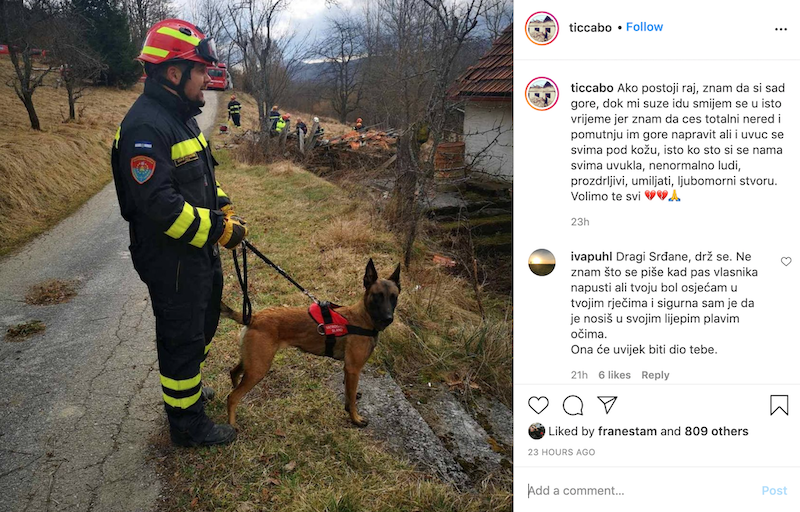
"If there is a heaven, I know that you are up there now. While my tears are flowing, I laugh at the same time because I know that you will make a total mess and confuse them upstairs, but also crawl under everyone's skin, just like all of ours, you abnormally crazy, voracious, cuddly, jealous creature. We all love you."
Unfortunately, it is too late for Alice and hundreds of other animals in Croatia.
Sources: Dubrovacki Vjesnik, Dubrovnik Net, Telegram.hr
To read more news in Croatia, follow TCN's dedicated page.


